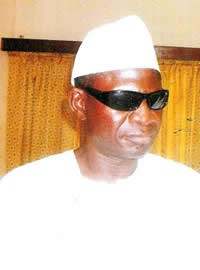- Home - News
- TWI News | TV
- Polls
- Year In Review
- News Archive
- Crime & Punishment
- Politics
- Regional
- Editorial
- Health
- Ghanaians Abroad
- Tabloid
- Africa
- Religion
- Election 2020
- Coronavirus
- News Videos | TV
- Photo Archives
- News Headlines
- Press Release
General News of Monday, 4 February 2013
Source: CitiFM
Rejection of Chieftaincy Minister is a human right abuse - Amnesty International

Human Rights group, Amnesty International Ghana has described calls for the Minister designate for Chieftaincy and Traditional Affairs be replaced as a grave human right abuse because he is visually impaired.
Some chiefs across the country who have called on President Mahama to change Dr. Henry Seidu Dannaa (Pictured) because their traditions do not allow any direct contact with a physically challenged person.
Dr. Henry Seidu Dannaa would become the first physically challenged Minister when approved the Appointments Committee of parliament.
According to the Director of Amnesty International Ghana, Mr Lawrence Amesu, Dr. Danaa’s condition does not mean that he is incapable of running a Ministry.
“It is sad because he is going to be a minister for the whole nation so the fact that the culture of a certain group doesn’t allow a blind person does not mean that this person cannot perform,” he lamented.
Meanwhile, speaking on Citi Breakfast Show Mr. Obiri Yeboah a Sociologist and a chief has said the calls have nothing to do with chieftaincy .
According to him, the main issue has to do with the stool that is the criteria for selecting chiefs.
“He indicated that the qualification of a person who wants to be a chief is that you must be right in all senses” he said.
This is because you would be interacting with people and you need to be able to hear, see and be able to respond to people since it involves a lot of activities.
He further stated that in the palaces we have people who are visually impaired especially the elderly people because it is believed that they have lots of wisdom.
He also said that “the reason why a chief might not come into contact with a disabled person is because a chief must not shed tears in public and sometimes when you meet such people; it can make you shed a tear.”
Therefore although the disabled can’t be chiefs they can be subjects.










